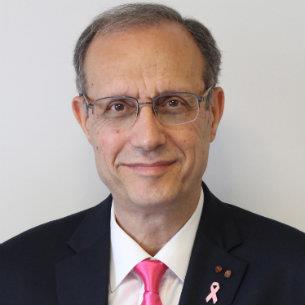It is with great satisfaction that the Breast Cancer Center of Excellence at the NK Basile Cancer Institute (NKBCI) at the American University of Beirut Medical Center (@AUBMC_Official) held the 8th Annual Beirut Breast Cancer Conference (BBCC-8; #BBCC2020) during challenging times of political and financial unrest in Lebanon. While in previous years the BBCC attracted large numbers of attendees from neighboring Arab countries, the majority of the 295 participants this year were from Lebanon. International faculty included speakers from Lebanon and Egypt (Dr. Hamdy A. Azim and Dr. Alaa Kandil), Belgium (Dr. Ahmad Awada @JulesBordet), Jordan (Dr. Sana Al-Sukhun and Dr. Mahmoud Al-Masri @KHCFKHCC), Spain (Dr. Javier Cortes @VHIO) and the United States (Dr. Mahmoud El-Tamer @sloan_kettering).
Dr. Mahmoud El-Tamer gives a presentation during the second day of BBCC-8.
At the traditional Opening Ceremony, where we always try to offer a very creative and engaging program, we held a debate, hosted by the experienced journalist Roula Mouawad of Annahar Lebanese Newspaper, on the treatment of patients with cancer in the current climate of economic and financial crisis in Lebanon. Lebanon is known to have very highly reputable medical infrastructure and qualified physicians and allied health care providers, mostly in the private sector, as well as a large percentage of uninsured patients who need public assistance, similar to most low- and middle-income countries (LMICs). For those patients, access is available at public hospitals and private hospitals who bill the Ministry of Health for such services.
Participants in the debate agreed that physicians should follow the guidelines issued by the Ministry of Health for the treatment of patients with cancer, and that medical institutions should enforce quality control measures and implementation of guidelines that include optimal use of diagnostic tools and proper surgical interventions, as well as judicial use of new expensive targeted and immunotherapy cancer medicines. According to Dr. Mohamad Haidar, advisor to the Minister of Health, and Dr. Nizar Bitar, president of the Lebanese Society of Medical Oncology, more than 70% of the budget for cancer care was spent on immunotherapy drugs last year. This has drained the Ministry of Health resources and they stressed the importance of adherence to guidelines and attention to resources. Audience members were referred to the guidelines of the Ministry of Health, guidelines implementation publications by the Breast Health Global Initiative that are in press in the journal Cancer, and an article on global access to cancer medicines by Javier Cortes et al. published in February 2020 in CA: A Cancer Journal for Clinicians. As benefits and medical coverage are a universal problem for unemployed people in Lebanon and most LMICs, the debate panel also advocated for options for non-interruption of insurance coverage for patients with cancer when they are laid off.
The panel stressed the importance of multidisciplinary management and tumor boards at all hospitals that treat cancer to improve patient outcomes and reduce complications, which would also reduce the financial burden. Hospitals are asked to invest efforts and staff in order to ensure multidisciplinary care. For that purpose, advanced communication between rural, distant, and small hospitals with major university hospitals is recommended in Lebanon and worldwide.
In addition to didactic lectures, the most popular sessions at BBCC-8 were again the breast tumor boards, where real breast cancer cases were presented and discussed by the audience and multidisciplinary panels. Parallel oncology nursing, clinical pharmacy, Lebanese Breast Cancer Foundation (@LBCFoundation) and non-governmental organization (NGO) sessions included continuing education updates, patient navigation, and advocacy. BBCC-8 concluded with a poster discussion/oral presentation session where residents and fellows from the American University of Beirut (@AUB_Lebanon) and Université Saint Joseph (@USJLiban) presented their research and innovations regarding awareness campaigns (including the MaTense app) and excellent recent outcomes and survival rates of patients with breast cancer in Lebanon.
BBCC-8 Best Abstract winners with Dr. El Saghir (center) and meeting faculty.


Recent posts